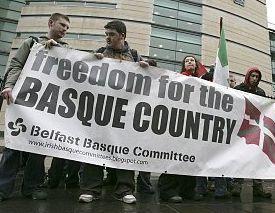
The extradition proceedings in Belfast involving Inaki de Juana Chaos have once again thrown a spotlight on the treatment by Spain of Basque prisoners. De Juana Chaos was imprisoned by Spain for
The extradition proceedings in Belfast involving Inaki de Juana Chaos have once again thrown a spotlight on the treatment by Spain of Basque prisoners.
De Juana Chaos was imprisoned by Spain for 21 years and spent 18 of those years in solitary confinement. His years of enforced solitude were however not the only barbaric and injurious treatment he was forced to endure whilst a prisoner of the Spanish State.
When, in protest against Spain's unilateral suspension of his release date (after he had completed 18 years of his sentence) de Juana Chaos commenced a hunger strike, the Spanish authorities resorted to force-feeding.
His case was the subject of a special investigation by the European Committee for the Prevention of Torture (CPT) which dispatched a delegation to investigate his case (link to full CPT report below).
The Celtic League has great respect for the CPT as a institution (as evidenced by our frequent reference to it and its work) however in the case of this Basque prisoner the CPT and European Human Rights generally were found wanting.
The CPT concluded:
"The medical decision to begin force-feeding Mr De Juana was taken after a close monitoring of his health by qualified medical staff during a considerable period of time. Further, the decision to begin force-feeding was taken jointly by the three independent doctors. Therefore the criterion of medical necessity can be considered to be satisfied, within the specific legal framework in Spain. Moreover, the actual treatment was executed in a hospital under appropriate conditions.
The decision to force-feed Mr De Juana followed an established procedure, in the form of both the Protocolo de Actuación; huelga de hambre and Article 210 (1) of the Prison Regulations, which included the possibility of an appeal and a certain degree of monitoring. However, the CPT considers that the process of judicial scrutiny and monitoring of prisoners on hunger strike could be reinforced and that an ongoing psychiatric assessment should be introduced.
From an assessment of the methods used to execute the force-feeding, and other information provided to the CPT, the Committee gained the impression that the methods were applied with care and the use of restraints were properly recorded; the restraints were removed when they were judged to be no longer necessary.
To sum up, in the case of the force-feeding of Mr De Juana, the CPT is of the view that the various actors responsible for implementing the decision to force-feed him took into careful consideration the elements which are articulated in paragraph 14 of this report."
To `cover its back' the CPT added a rider to the effect that:
"Nothing in this report should be interpreted to mean that the CPT believes that it is right to force- feed a detained person. On the contrary, this Committee believes that it is not its role to pronounce on this question. Nevertheless, if a decision to force feed an inmate is taken, such a decision should at a minimum meet the criteria listed in paragraph 14 above."
The World Medical Association however is not as reticent as the CPT in condemning force-feeding in `The Declaration of Tokyo`..
The Declaration of Tokyo was adopted in October 1975 during the 29th General assembly of the World Health Organisation, and later editorially updated by the WMA in France, May 2005 and 2006. It declares torture to be "contrary to the laws of humanity," and antithetical to the "higher purpose" of the physician, which is to "alleviate the distress of his or her fellow human being. "The policy states that doctors should refuse to participate in, condone, or give permission for torture, degradation, or cruel treatment of prisoners or detainees. According to the policy, a prisoner who refuses to eat should not be fed artificially against his will, provided that he or she is judged to be rational.
The Spanish State, not content with extending his prison term subjecting him to torture, are determined to have de Juana Chaos returned to their jurisdiction.
It is to be hoped that de Juana Chaos gets fairer treatment from the British judicial system than he got from the CPT.
CPT report on the force-feeding of Inaki de Juana Chaos here:
http://www.cpt.coe.int/documents/esp/2009-10-inf-eng.htmWHO - Declaration of Tokyo here:
http://www.wma.net/e/policy/c18.htmWikipedia biography details of Inaki de Juana Chaos
http://en.wikipedia.org/wiki/Inaki_de_Juana_ChaosJ B Moffatt Director of Information Celtic League
26/04/09
 The Celtic League has branches in the six Celtic Countries. It works to promote cooperation between these countries and campaigns on a broad range of political, cultural and environmental matters. It highlights human rights abuse, monitors all military activity and focuses on socio-economic issues.
TEL (UK) 01624 877918
MOBILE (UK)07624 491609
(voir le site)
The Celtic League has branches in the six Celtic Countries. It works to promote cooperation between these countries and campaigns on a broad range of political, cultural and environmental matters. It highlights human rights abuse, monitors all military activity and focuses on socio-economic issues.
TEL (UK) 01624 877918
MOBILE (UK)07624 491609
(voir le site)

Commentaires (0)
Aucun commentaire pour le moment. Soyez le premier à réagir !